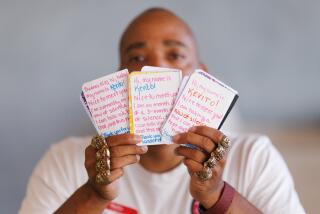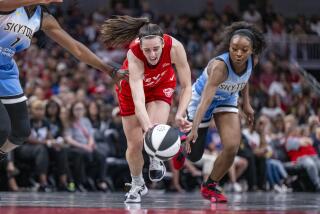A Teen’s Slide From Hero to Sad Statistic
- Share via
MILWAUKEE — For a few brief moments in May 1996, they were on a first-name basis: Oprah and Lafayette.
Oprah Winfrey had invited Lafayette Clark to appear on her talk show, where the 14-year-old recounted his tale of foiling a kidnapping near his Milwaukee home. “Lafayette, . . . brave man you were,” Winfrey told him before millions of viewers.
He came home a hero, a title that sat uneasily upon the teen’s thin shoulders. He was honored by the police and hailed in the local paper. The attention was OK, but the fatherless boy craved the acceptance of his peers.
He craved that acceptance so much that it killed him, his family believes.
On Jan. 10, Lafayette--now a high school dropout, an absentee father, an armed robber--was dead, accidentally killed by a “friend” in a botched robbery at a reputed drug house, authorities said.
Lafayette Clark, hero, was now Lafayette Clark, statistic. He was 17.
Desperate Effort to Fit In
How to explain his precipitous spiral, how it all went downhill so quickly? There are no simple answers, but his family thinks that Lafayette--struggling on the slippery slope between adolescence and adulthood--was desperately searching for a place to fit in.
He just chose the wrong place.
His family recalls the nerdy teen who did Eddie Murphy impressions, who fixed bicycles and gave haircuts to his pals. But there was another Lafayette: the wannabe tough guy who quit school, fathered three kids by three women and strived to impress the wrong crowd.
That crowd was unimpressed by his good deeds. “Good Samaritan,” they sneered. “Sissy,” they mocked. And Lafayette Clark rose to the bait.
“He was a kid caught between childhood and trying to be an adult,” recalled his uncle, Darron Reed, who tried desperately to save the boy. “He didn’t fit in the night life. He was trying to be in a place where he didn’t fit in.
“And then the inevitable happened.”
The inevitable: Live by the streets, die by the streets. If the conclusion was inevitable, the rest of Lafayette’s tale was by turns improbable, heroic, sad and horrifying.
*
It was April 28, 1995, and Lafayette Clark, then 13, was bicycling home from school. The eighth-grader spotted a boy about his age running naked down the street, weeping and trying to pull on his clothes. Lafayette asked what was wrong; as the boy answered, a man with a gun drove up and snatched the child away.
Lafayette pulled a school notebook from his back pocket and wrote down the car’s description and plate number. When the car drove off, he followed. When the car stopped and the man took the boy into a nearby house, Lafayette wrote down the address.
Then he pedaled to a phone and dialed 911. The suspect was arrested on charges of abduction and armed robbery, and the boy returned safely to his family.
Lafayette continued home and said nothing about the day’s events.
No surprise there. He was not the kind of kid who drew attention to himself.
But word of his good deed spread, and nine months later he became the youngest recipient of a police Merit Award, one of only two civilians so honored that year in Milwaukee. On May 14, 1996, he appeared on the Winfrey show. His family watched proudly.
“He was calm, not nervous,” Reed remembered, incredulity still in his voice. “I mean, a kid his age. Talking to Oprah.”
The boy was invited to join various youth activities around town, but his family said nobody ever followed through on the offers. The youth and his story soon became yesterday’s news.
Heroism Mocked in Neighborhood
Back in his neighborhood, Lafayette’s heroism was mocked. Stung by the harsh words, he began hanging out with a rougher crowd, bidding for street credibility. He was arrested on misdemeanor charges for “small stuff,” his uncle recalled--fighting, or skipping school.
The oldest of seven children reared by a single mother, he had played basketball, but had balanced it with books. His favorite classes had been science, math and social studies. Other kids might foster NBA dreams; Lafayette was an aspiring architect.
But he became a mere memory at Custer High School. Last fall he attended just a handful of classes. He had two children and a third on the way--with three different women--in three years. He survived a street shooting; details of that incident remain sketchy even now.
As Lafayette grew older, his father’s absence became an ever-larger void. Lafayette would make up stories about gifts and visits from his missing dad.
In August, his mother, Lorraine Allen, left the city for a quieter life in Green Bay. Lafayette moved in with his aunt and uncle, Darron and Victoria Reed, in a quiet residential part of north Milwaukee. His mom hoped Darron would be Lafayette’s role model.
But Lafayette became convinced he was a burden. Increasingly, he turned to the streets.
*
One winter’s night last month, Lafayette Clark turned the corner onto the 2800 block of North 13th Street. He was four miles east of his uncle’s safe two-family home, and a world away from the Oprah Winfrey show.
The block had seen better days; pigeons roosted in a pair of boarded-up houses. Lafayette walked with two friends, headed for what they hoped would be a big score at an alleged drug house. Authorities gave this version of what happened next:
The heavily armed trio approached the house, ignoring the pointed question posted on its front door: “What part of no trespassing don’t you understand?” Posing as police officers, they kicked down the door.
They ordered the woman inside to lie on the floor, and robbed her. Surprised when her fiance burst into the house, the bandits fled with $60, a necklace and some rings.
Outside, another surprise awaited: watchdogs. One of the bandits opened fire on the dogs, the muzzle flash lighting up the yard. A bullet struck Lafayette in the back, tore through his aorta and came out his chest.
He died at 10:03 p.m. at St. Joseph’s Hospital. His aunt, Victoria Reed, called his mother in Green Bay to deliver the news.
Two days later, at Lafayette’s funeral, the Ephesians Church was filled with family and friends. A funeral cortege of more than 30 cars accompanied his body to the cemetery.
In the midst of the mourning and weeping, Darron Reed, the uncle, took in a heart-rending sight: Lafayette’s own kids watching their father’s funeral. Like Lafayette, they would now grow up without a dad.
“They will never have a chance to know their father,” he said quietly, shaking his head. “He will never have a chance to know his babies.”
Reed paused for a moment, then continued: “That’s the sad part. He was just a kid too.”
Jennifer Batog of the AP bureau in Milwaukee contributed to this report.
More to Read
Sign up for Essential California
The most important California stories and recommendations in your inbox every morning.
You may occasionally receive promotional content from the Los Angeles Times.













